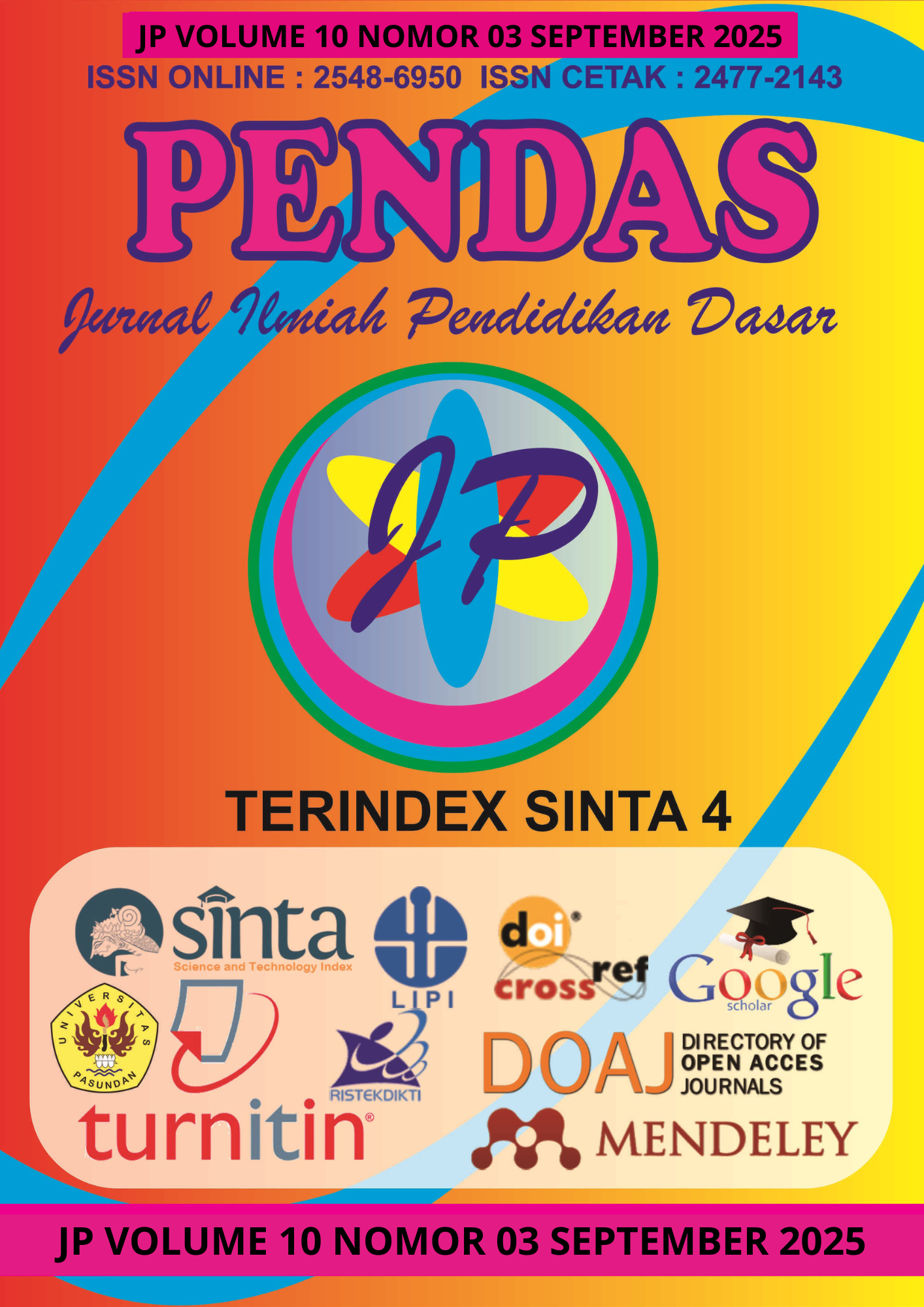PENGARUH MODEL GROUP INVESTIGATION (GI) BERBASIS CASE METHOD TERHADAP KETERAMPILAN KOLABORASI DAN PEMECAHAN MASALAH
DOI:
https://doi.org/10.23969/jp.v10i03.31406Keywords:
group investigation, collaboration, problem-solvingAbstract
This study originated from the recognition that students lacked sufficient exposure to collaborative learning environments and had limited experience in structured problem-solving. The research set out to analyze the impact of implementing the Group Investigation model, combined with the Case Method approach, on enhancing students’ teamwork and problem-resolution capabilities. A true experimental method was applied, utilizing a pretest-posttest control group design, and the research was conducted at MI Miftahul Ulum 2 Kaplongan Lor. The participants included 40 students, evenly assigned to experimental and control groups. Data collection instruments included essay-based assessments to gauge problem-solving and closed-format questionnaires to measure collaboration. Analysis through independent samples t-tests revealed meaningful distinctions between the two groups in both areas, as indicated by an Asymp. Sig. (2-tailed) value of 0.000. The R² value of 0.462 suggests that 46.2 percent of the variance in problem-solving improvement could be linked to the intervention. These results demonstrate that the Group Investigation learning strategy, when integrated with the Case Method, is effective in significantly strengthening both collaborative and problem-solving skills among students.
Downloads
References
Abdullah, K., Jannah, M., Aiman, U., Hasda, S., Fadilla, Z., Taqwin, Masita, Ardiawan, K. N., & Sari, M. E. (2022). Metode Penelitian Kuantitatif (N. Saputra (ed.)). Yayasan Penerbit Muhammad Zain.
Afdilla, A. N., Rednoningsih, T., & Sukaesih, S. (2024). Peningkatan Keterampilan Kolaborasi Melalui Model Discovery Learning pada Pembelajaran IPA Kelas VIII B SMP Negeri 4 Semarang. Seminar Nasional Pendidikan Dan Penelitian Tindakan Kelas, 99–111. https://proceeding.unnes.ac.id/snpptk/article/view/3134
Anggelita, D. M., Mustaji, & Mariono, A. (2020). Pengaruh Keterampilan Kolaborasi Terhadap Kemampuan Pemecahan Masalah Peserta didik SMK. Educate: Jurnal Teknologi Pendidikan, 5(2), 21–30. https://doi.org/10.32832/educate.v5i2.3323
Artika, W., Amalya, C. P., Safrida, S., Maulida, M., Afandi, A., & Ratna, L. (2023). Applying Environmental-STEM Approach on Pollution Issue Material to Enhance Students’ Problem-Solving Skills. Jurnal Penelitian Pendidikan IPA, 9(5), 4036–4042. https://doi.org/10.29303/jppipa.v9i5.3846
Atira, Babo, R., & Muhajir. (2021). The Effect of Problem-Based Collaborative Learning Model on Motivation and Problem-Solving Ability In Social Studies Learning for 5th Grade Elementary School Students. Indonesian Journal of Primary Education, 5(1), 23–31. https://doi.org/10.17509/ijpe.v6i1.44166
Babullah, R., Qomariyah, S., Neneng, Natadireja, U., & Nurafifah, S. (2024). Kolaborasi Metode Diskusi Kelompok Dengan Problem Solving Learning Untuk Meningkatkan Keterampilan Pemecahan Masalah Siswa Pada Materi Aqidah Akhlak. Jurnal Budi Pekerti Agama Islam, 2(2), 65–84. https://doi.org/10.61132/jbpai.v2i2.132
Boholano, H. (2017). Smart social networking: 21st Century teaching and learning skills. Research in Pedagogy, 7(2), 21–29. https://doi.org/10.17810/2015.45
Fauzi, A., Ermiana, I., Nur Kholifatur Rosyidah, A., & Sobri, M. (2023). The Effectiveness of Case Method Learning in View of Students’ Critical Thinking Ability. Pedagogia : Jurnal Pendidikan, 12(1), 15–33. https://doi.org/10.21070/pedagogia.v11i1.1544
Hastuti, K. P., & Aristin, N. F. (2022). Model Flippep-Case Project Untuk Meningkatkan Six Competency Skills. Media Nusa Creative (MNC Publishing). https://books.google.co.id/books?id=fTeiEAAAQBAJ
Irawan, D. P., Warman, Jamil, Asnar, Marqiah, & Herliah, E. (2024). Analisis Kemampuan Kolaborasi Peserta Didik Melalui Model Pembelajaran Kooperatif Tipe Group Investigation ( GI ) pada Pembelajaran PKn Kelas XI SMA Negeri 11 Samarinda ( 2008 ). Jurnal Inovasi Pendidikan, 1(4), 24–37. https://doi.org/https://doi.org/10.62383/edukasi.v1i4.603
Khaltsum, U. (2023). Pengaruh Model Pembelajaran RADEC Berbantuan Media I-Spring Terhadap Kemampuan Berbahasa Siswa SD di Kota Makassar. Edukasi Islami: Jurnal Pendidikan Islam, 12(4), 1–16. https://doi.org/10.30868/ei.v12i04.7160
Labibah, K., & Marsofiyati. (2025). Dampak Pendekatan Pembelajaran Kolaboratif terhadap Keterampilan Sosial Siswa : Studi Pustaka. Journal of Student Research, 3(1), 181–190. https://doi.org/https://doi.org/10.55606/jsr.v3i1.3545
Mawaddah, R., Triwoelandari, R., Irfani, F., Ibn, U., & Bogor, K. (2022). Kelayakan LKS Pembelajaran IPA Berbasis STEM Untuk Meningkatkan Keterampilan Kolaborasi Sistem SD/MI. Jurnal Cakrawala Pendas, 8(1), 1–14. https://doi.org/https://doi.org/10.31949/jcp.v8i1.1911
Mayasari, D., & Hanim, S. (2024). Pengembangan Literasi Sains Siswa Melalui Pendekatan Pembelajaran Terpadu. Jurnal Review Pendidikan Dasar: Jurnal Kajian Pendidikan Dan Hasil Penelitian, 10(03), 197–202. https://doi.org/https://doi.org/10.26740/jrpd.v10n3.p197%20-%20202
Nasution, F. U., Amanda, N., Galingging, P. I., & Arwita, W. (2024). Permasalahan Kolaborasi Siswa dengan Penerapan Model Project Based Learning (PjBL) di SMA Negeri 14 Medan. Nnovative: Journal Of Social Science Research, 4(3), 9800–9807. https://doi.org/https://doi.org/10.31004/innovative.v4i3.11507
Nurdiansyah, Rahma, A. R., Trisnawati, P., & Maria, S. (2024). Pengembangan Model Pembelajaran Kolaboratif untuk Meningkatkan Kemampuan Problem Solving Siswa dalam Pembelajaran IPS di SD. Jurnal Pendidikan Tambusai, 8(2), 21705–21718.
Paramita, R. W. D., Rizal, N., & Sulistyan, R. B. (2021). Metode Penelitian Kuantitatif (3rd ed.). Widya Gama Press.
Priadana, S., & Sunarsi, D. (2021). Metode Penelitian Kuantitatif. Pascal Books.
Rahman, F., Rahmiaty, & Meylina. (2022). Instrumen Penelitian: Panduan Penelitian di Bidang Pendidikan - Jejak Pustaka. Jejak Pustaka. https://books.google.co.id/books?id=CSikEAAAQBAJ
Septikasari, R., & Frasandy, R. N. (2018). Keterampilan 4C Abad 21 dalam Pembelajaran Pendidikan Dasar. Jurnal Tarbiyah Al-Awlad, 8(2), 112–122. https://doi.org/https://doi.org/10.15548/alawlad.v8i2.1597
Siregar, T. E., Luali, N., Vinalistyosari, R. C., Hanurawan, F., & Anggraini, A. E. (2024). Implementation of Vygotsky’s Constructivism Learning Theory through Project-Based Learning (PjBL) in Elementary Science Education. Al Qalam: Jurnal Ilmiah Keagamaan Dan Kemasyarakatan, 18(4), 2586–2607. https://doi.org/10.35931/aq.v18i4.3620
Soesana, A., Subakti, H., Fitri, A., Kuswandi, S., Sastri, L., Falani, I., Aswan, N., Hasibuan, F. A., & Lestari, H. (2023). Metodologi Penelitian Kualitatif (1st ed.). Yayasan Kita Menulis.
Sundayana, R. (2020). Statistika Penelitian Pendidikan. Alfabeta.
Supiandi, M. I., & Ege, B. (2019). The Effect of Group Investigation (GI) Learning Model on the Student Problem Solving Ability and Students Academic Achievement on the Digestive System Material for Biology Students. Anatolian Journal of Education, 2(2), 56–65. https://doi.org/10.29333/aje.2017.225a
Supratiningsih, Dafik, & Farisi, M. I. (2021). An analysis of STAD cooperative learning implementation and its effect on the collaborative skill in solving the problems of addition and subtraction. Journal of Physics: Conference Series, 1839(1), 1–14. https://doi.org/10.1088/1742-6596/1839/1/012037
Susanto, H. A. (2019). Pemahaman Pemecahan Masalah Berdasar Gaya Kognitif. Deepublish.
Yuliyanti, A., & Rahayu, T. S. (2021). Efektifitas Model Pembelajaran Problem Solving dan Group Investigation terhadap Kemampuan Berpikir Kritis Siswa SD dalam Pembelajaran Matematika: Meta – Analisis. Thinking Skills and Creativity Journal, 4(1), 40–47. https://doi.org/10.23887/tscj.v4i1.33518
Downloads
Published
Issue
Section
License
Copyright (c) 2025 Pendas : Jurnal Ilmiah Pendidikan Dasar

This work is licensed under a Creative Commons Attribution 4.0 International License.



















